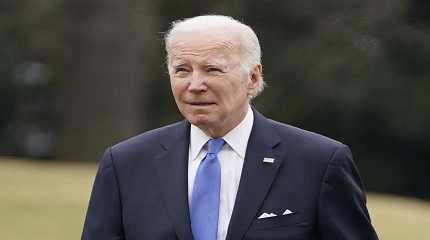
LOS ANGELES, April 12 (Xinhua) -- U.S. President Joe Biden signed a bill on Monday terminating the country's COVID-19 national emergency, a month earlier than the administration had planned. A leading epidemiologist said the decision adds burdens to the financially-challenged population in the United States.
The new bill immediately ended the U.S. national emergency over COVID-19 enacted during the previous administration and continued through the Biden administration.
Former U.S. President Donald Trump declared the national emergency over COVID-19 in March 2020, which allowed for federal funding to be freed up to states and cities for efforts including testing, vaccination, treatment, among other emergency measures.
"The new change hits hard the poor population as free COVID-19 vaccines, treatments and testing which was previously covered by the government will now have to be paid by health insurance," Zhang Zuofeng, professor and chair of the Department of Epidemiology at the University of California, Los Angeles, said in an interview with Xinhua on Wednesday.
"More than 5 million poor people in the United States will lose their eligibility for Medicaid which they received during the pandemic," Zhang noted.
Biden signed the bill following a 68-23 pass by the U.S. Senate at the end of March, and a 220-210 vote by the U.S. House in late January.
The Monday signing marked the winding down of several policies and provisions the country had put in place to combat the spread of the coronavirus, with several more, including the Title 42 immigration policy, set to end along with the country's public emergency over COVID-19 next month.
The White House warned earlier this year it "would create wide-ranging chaos and uncertainty throughout the health care system."
The resolution will end a number of waivers for federal health programs Medicare, Medicaid and CHIP, however, many of the changes to health care regulations have become largely irrelevant as COVID-19 precautions have been relaxed, said a report of The Hill.
"In 2021, nearly 30 million American people, approximately 9.2 percent of the U.S. population, did not have health insurance," Zhang told Xinhua.
"The termination of the national emergency will have a huge impact on those population," he noted.
Other programs affected by the end of the national emergency include mortgage forbearance at the U.S. Department of Housing and Urban Development, and requirements for home visits to evaluate eligibility for caregiver assistance by the U.S. Veteran Affairs Department, a senior official of the Biden administration was quoted by NBC News as saying.
The United States is also set to put an end to its public health emergency over COVID-19 on May 11, which may institute sweeping changes across the health care system.




